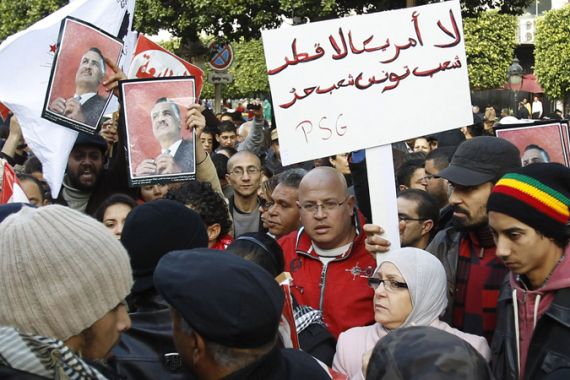Tunisians mark one year since Ben Ali fled
Celebrations and protests mark anniversary of president’s departure, amid ongoing political divisions and lack of jobs.

Thousands of Tunisians have turned out in central Tunis to demand jobs and dignity as the north African country marked a year to the day since Zine El Abidine Ben Ali, its president, fled into exile.
“Work, freedom and dignity”, “Work is a right” and “We will continue the fight”, were among the slogans chanted on Saturday by demonstrators brandishing banners on the avenue which was the epicentre of the popular uprising that gave birth to the Arab Spring.
“We made this revolution against the dictatorship to impose our right to a dignified life and not to help certain opportunists realise their political ambitions,” Salem Zitouni, 33, told the AFP news agency.
Other demonstrators, wearing the red and white of the national flag, called for recognition of the “martyrs” killed during the weeks of unrest before Ben Ali was toppled.
“We are faithful to the blood of the martyrs,” and “We will never forget our martyrs,” their banners read.
Some also chanted the now famous “Get lost” and “Good riddance” that had accompanied calls for Ben Ali’s resignation in the weeks leading up to his ousting on January 14, 2011.
Several people who were wounded in the revolution began a sit-in outside the government headquarters in the old town Kasbah.
Al Jazeera’a Nazanine Moshiri, reporting from Tunis, said: “Today is a day of celebration, but also a time of reflection.”
“More than 200 people died [in the revolution] and unemployment is still a huge issue here. This week alone, we’ve had four people set themselves on fire, like Mohamed Bouazizi.”
Pride of place on Saturday was given to the memory of Bouazizi, the 26-year-old vegetable seller from the central town of Sidi Bouzid, whose desperate act in setting fire to himself was the trigger of the revolt.
Arab Spring birthplace
Tunisia’s revolution, which culminated in a peaceful election in October, has inspired reform movements throughout the Middle East, including the downfall of long-standing autocrats such Hosni Mubarak in Egypt and Muammar Gaddafi in Libya.
Leaders from Tunisia’s neighbours, as well as other Arab countries, were expected to take part in anniversary celebrations over the weekend.
|
Nazanine Moshiri reports from Tunis |
Among the most prominent guests that Tunisia’s democratically elected leaders will host on Saturday, Algerian President Abdelaziz Bouteflika, who was a minister in his country’s first post-independence government half a century ago, has so far weathered growing social discontent.
The emir of Qatar, Sheikh Hamad bin Khalifa Al Thani, seen as one of the main sponsors of the Arab Spring, is also in the Tunisian capital.
Foreign Minister Saad-Eddine El Othmani will represent Morocco, where King Mohamed VI introduced reforms curbing his near absolute powers in a bid to nip growing Tunisian-inspired street protests in the bud.
The head of Libya’s new National Transitional Council, Mustafa Abdel Jalil, was expected for the celebrations, for which no detailed programme has been issued.
Weeks after Ben Ali hurriedly fled Tunisia for Saudi Arabia, a rebellion started in neighbouring Libya, eventually toppling Gaddafi’s regime.
New government
Ben Ali has been convicted of economic and other crimes by Tunisian courts and was granted exile in Saudi Arabia after his plane was denied permission to land in France.
According to the new authorities in Tunisia, Riyadh has twice ignored extradition requests for Ben Ali, who faces an avalanche of trials if he returns.
Tunisia’s Prime Minister Hamadi Jebali, of the moderate Islamist Ennahdha party, has been officially invited to visit Saudi Arabia.
Among the problems that remain to be solved by the new authorities are soaring unemployment of 19 per cent nationally – rising up to 50 per cent in certain inland areas overlooked for investment in the past – and widespread social discontent.
Corruption also remains a challenge, with Transparency International downgrading the country from 59th to 73rd place out of 183 countries on its corruption list, amid fears that former government officials have blended into the new political landscape.
“We see a different Tunisia,” Amine Ghali of the Al Kawakibi Democracy Transition Centre told Al Jazeera.
“We are not in a democratic country. We are in a country that is trying to transform into a democracy and it’s not an easy process.
“The economic and social problems are still here and politicans have to tackle these problems in the right way.
“Tunisia, I would say, is a more a politicised country … I wouldn’t say its divided, but it’s politicised.”
Also to mark the anniversary, Tunisia granted an amnesty or conditional release from prison to 9,000 detainees.
The amnesty, on what is now a public holiday in Tunisia, includes Tunisian and foreign prisoners.
Capital punishment of another 122 detainees was converted to life imprisonment. The death penalty remains on the books in the country but is no longer applied.